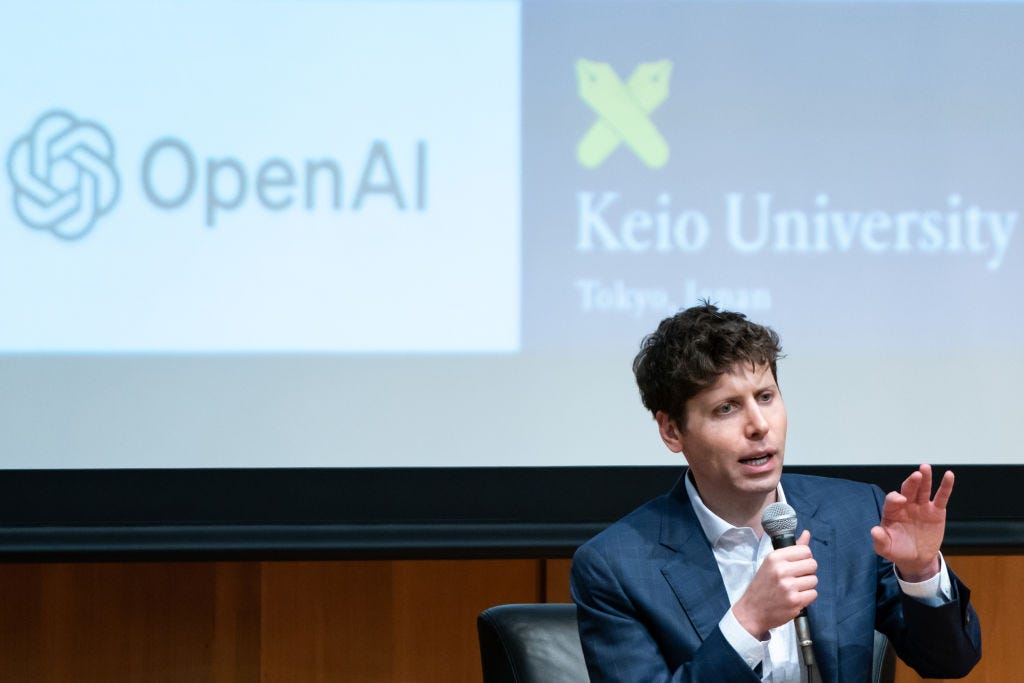Hello and welcome to the latest edition of Off to Lunch…
It is nearly a year since OpenAI released ChatGPT to the world, sparking excitement - and trepidation - about how artificial intelligence could change the way we work and lead to a technological revolution.
But there are still plenty of questions about what comes next - for AI technology and OpenAI, whose chief executive Sam Altman is pictured above.
The Wall Street Journal is reporting that OpenAI is in talks with investors about selling shares in the company in a deal that could value it at $90 billion (£74 billion). That valuation would make OpenAI one of the most valuable privately-held tech companies in the world alongside Elon Musk’s SpaceX, ByteDance, the parent company of TikTok, and Shein, the Chinese online fashion retailer.
You can read the WSJ story here
OpenAI is 49 per cent owned by Microsoft and has reportedly told investors that it expects to generate $1 billion of revenues this year. But there are doubts about how profitable it can be given the cost of running ChatGPT, which launched last November.
AI expert Gary Marcus has said in a new analysis that OpenAI faces a collection of challenges, including the “extremely expensive” cost of training and operating ChatGPT, the threat of litigation from publishers over copyright infringement, competition from new technology and questions about how businesses will actually use AI. He adds:
“I have no doubt, of course, that some AI companies will eventually merit these stratospheric valuations, but I am not convinced that a pure LLM play (Large Language Models, like ChatGPT] ever will.”
You can read that analysis here
We are starting to see how chatbots like ChatGPT could evolve into products that consumers and businesses use. For example, The Information is reporting that Jony Ive, the former Apple designer, is in talks with OpenAI and Altman about developing a hardware product that uses the company’s technology. Softbank, the Japanese investor, has also been involved in these talks, the story says, although there are few details on what the product could be. You can read that story here.
Meanwhile, Spotify has said it will use AI technology to translate podcasts into different languages while using the voices of the same presenters. You can read the company’s announcement on that here.
This has all emerged just a couple of days after Amazon said it was investing up to $4 billion in AI technology by taking a stake in Anthropic, a start-up that has developed its own ChatGPT-style chatbot called Claude. Story on that here
Other stories that matter…
1. The Financial Conduct Authority, the City regulator, is to launch a review of how privately-held assets such as property and unlisted businesses are valued because of concerns that these markets are vulnerable to a financial crisis. Financial Times story here
2. The North Sea Transition Authority, the UK regulator, has granted approval for the largest untapped oil field in UK waters to be developed. The Rosebank oil field is 80 miles west of the Shetland Islands and will be developed by Norwegian company Equinor and FTSE 250 business Ithaca Energy despite a backlash from campaigners. BBC story here
3. A high-profile crypto conference is being moved from Washington to London. The Digital Asset Summit 2024 will now be in London instead of the US capital. The organiser of the event, Blockworks, said London “has become one of the world’s hottest crypto hubs”. In contrast, Washington is "not the best place to host an institutional crypto event”, they said. More details here
4. Energy has overtaken fintech as the UK industry attracting the most funding from venture capital investors for new businesses, according to a story by Sifted here
5. The Financial Times has done a big feature on the alleged tension between staff and management at Dyson over flexible working. The company says that staff work “collaboratively, side by side, making discoveries through experiments and sparking ideas off each other” but former employees claim in the piece that they could work from home and that Dyson was strict about working in the office. The piece is an example of the ongoing debate within businesses about the best way to work. You can read the piece here
And finally…
Author Michael Lewis is going to present a daily podcast covering every moment of Sam Bankman-Fried’s fraud trial in the US. The podcast is called Judging Sam and will start on October 2. Lewis’s book on Bankman-Fried, the founder of collapsed crypto business FTX, will be released on October 3 and is called Going Infinite. You can listen to a preview of the podcast series below…
Thanks for reading. If you enjoy Off to Lunch then please share it with others and spread the word. If this newsletter was shared with you then please sign-up below to become a member, get Off to Lunch sent directly to your inbox, and contribute to the work of Off to Lunch
Best
Graham





